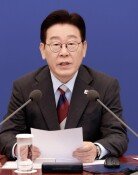Korean Women Optimistic about Retirement Savings
Korean Women Optimistic about Retirement Savings
Posted November. 01, 2004 23:02,
Bet everything on ones children when young, prepare for ones old age after the 40s.
A total of 86.9 percent of female respondents to a poll replied that they would take care of themselves without financial aid from their children when they became old. In particular, 82.6 percent of respondents said that they could live without financial support from their husband.
However, preparing for retirement, which is necessary in order to do so, was not a priority.
Many said that they use most of their household money on educational expenses (46.8 percent), housing (25.2 percent), and preparing for retirement (19.5 percent).
A housewife whose eldest child is in elementary school or whose youngest child is in middle school or high school appeared to use only 4.1 percent and 5.4 percent, respectively, of their household money to prepare for their retirement.
People who answered that preparation for retirement should start in ones 40s numbered the most, at 40.4 percent.
Commissioner Kim Jong-sook, the research manager of the Korean Women`s Development Institute, said, In particular, women who have no working experience expressed an optimistic view without a clue on retirement.
Investment Information from Friends, Investment Decisions with Husbands-
Respondents who had the power to employ their financial assets numbered 45.4 percent. However, the power to employ and manage living expenses, public fees, savings, and insurance occupied the most, while the power to invest, which accompanies risk, was relatively low.
A total of 13.5 percent of respondents had the decisive power to invest in assets that accompany risk. This implies that there is a tendency to rely on ones husband when it comes to financial management, which involves risk.
A total of 58.6 percent replied that the sources that they obtain information on managing money from were acquaintances such as friends, family, colleagues, the internet (16.0 percent), advertisements from the media (12.8 percent), and financial companies (11.0 percent).
Jung Sung-hwan, assistant manger of Samsung Investment Trust Management, said, As many as 42.5 percent of the respondents said that they do not receive new financial services without a recommendation from an acquaintance.
Lifetime Financial Planning and Investment Education is Urgently Needed-
Understanding the need for lifetime financial planning was very low regardless of age and academic background, with the number polled at around 20 percent.
A lifetime financial plan is the first step to managing money, such as planning a budget for each phase of ones lifetime, as well as ways to raise money.
People who said that they would deposit money if they were to obtain unexpected income were 33.7 percent, while 19.7 percent of women said they would invest it.
A total of 71.7 percent of respondents said that they preferred financial instruments that had fixed interest. On the other hand, only 24.4 percent of respondents said that they would take risks in order to gain high return.
Kim Il-sun, the director of the Asset Management Association of Korea, said, Various types of investment education and social attention are necessary in order to develop womens financial management ability.
Suk-Ho Shin kyle@donga.com





![아침 공복 따뜻한 물 한 잔, 정말 살 빠지고 해독될까?[건강팩트체크]](https://dimg.donga.com/c/138/175/90/1/wps/NEWS/IMAGE/2026/03/05/133467930.3.jpg)

